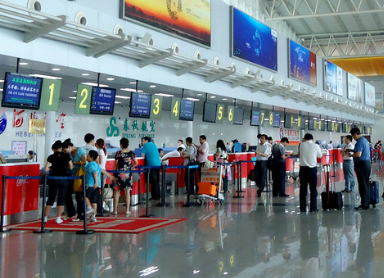(单词翻译:单击)

In recent years, there has been a welter of complaints among Americans about heavy-handed airport security procedures. Little wonder: since 2001, the US has heavily increased overall homeland security at a cost of more than $1,000bn and one consequence has been endless airport X-ray machines, body scanners, CCTV cameras and "pat-downs", which many Americans hate.
最近几年,美国人一直对过于严格的机场安检程序"怨声载道"。这也难怪:2001年以来,美国从整体上大大加强国土安全,投入的资金超过1万亿美元。后果之一就是机场无数的X光机、全身扫描机、监控摄像机,还有很多美国人痛恨的"搜身"。
But these days I have quite a different reason to feel profoundly irritated with airline security. Last week, my hand luggage mysteriously vanished as it went through those X-ray machines in JFK. And, to my shock, I have subsequently discovered that there is no way of telling what happened, since "improved" CCTV only covers part of the airport.
但最近这些天,由于完全不同的一个原因,我对机场安检感到无比烦恼。最近在迪机场(JFK),我的手提行李在经过X光机的时候神秘消失。让我感到吃惊的是,后来我发现根本就无法查找到底发生了什么情况,因为"经过改善的"闭路电视只监控机场的部分地区。
Hence, I am not only feeling annoyed. I am also wondering afresh about the social and psychological impact of all these cameras. Has all that trillion-dollar security spending actually made us "safer"? Or do such elaborate screening rituals cause us to turn off our brains? And how do we define safety anyway, at a time when political candidates for the 2012 election keep bandying about the word "security"?
因此,我不仅觉得烦恼,还开始揣测所有这些摄像机带来的社会和心理影响。上万亿美元的安全投入真的让我们"更安全"了吗?或是这些复杂的筛查套路让我们的大脑变得迟钝?说到底,在2012年大选的候选人都在大吹大擂"安全"这个字眼的时候,我们该如何定义"安全"?
My own story was grimly revealing. Last month, late one Friday night, I flew to England on American Airlines, via JFK. Since I was travelling to family celebrations, I had most of my favourite clothes with me in a black wheelie bag, which I took as hand luggage, ironically because I did not want to risk losing my belongings (according to a recent CBS report there are more than 200 reported thefts a day from checked luggage at JFK).
我自己的经历就颇能说明问题。上个月一个周五的深夜,我从肯尼迪机场乘坐美国航空公司的飞机前往英国。因为我是去参加一个家庭庆祝会的,我将所有最喜欢的衣服放在一个黑色滑轮包里。很有讽刺意味的是,因为怕把行李弄丢了(哥伦比亚广播公司(CBS)最近的一则报道显示,肯尼迪机场每天都有超过200件托运的行李被盗),所以我把它当手提行李随身携带。
Since it was late at night, the airport was half-empty, so I navigated the ticket line with ease and, half asleep, loaded my black bags on to the X-ray machine. But then, as I went into the body scanners, I looked away. And when I re-emerged, my black wheelie bag had completely disappeared.
因为已经是深夜,机场几乎是半空的,因此我轻松办理登记手续,然后(在半睡眠状态下)将我的黑色行李包放到X光机的传送带上。但随后,当我经过全身扫描机的时候,我把视线移开了。等我走出扫描机的时候,我那黑色的滑轮包就不见踪影了。
Shocked, I hunted around the X-ray machine ausing consternation among the guards and then we all dashed to the only other flight that was departing at the same time, to Qatar, to see if someone had my bag. But nobody on my flight, or the Qatar flight, confessed to taking it, and since the bag was scruffy, with a very wobbly handle, a mix-up seemed unlikely. Thus, when it had still not reappeared after several days, I came to the sad conclusion that somebody had probably stolen it, along with my favourite dresses. Or as Raymond Dilena, the charming police detective on my case, observed: "With the ID you had in the bag, and the tag, I think it should have turned up by now, so I kind of agree with you about it being stolen."
震惊之余,我开始在X光机周围疯狂地寻找,引发了警卫们的一阵恐慌,接着我们都冲向唯一一个在相同时间起飞的航班的登机口,那是飞往卡塔尔(Qatar)的,看有没有人拿了我的包。但不管是我搭乘的航班还是飞往卡塔尔的航班,都没有人承认拿了我的包。由于我的包非常破旧,手柄还是摇摇晃晃的,拿错是不太可能的。因此,几天之后它仍然没有出现,我就悲伤地断定,很可能有人偷了那个放满我最喜欢的衣服的包。用那位颇有魅力的警探雷蒙德-戴雷娜(Raymond Dilena)的话说,"既然包里有你的身份证件,外面还挂着标签,现在早就应该被送回来了,因此我也觉得它可能是被偷了。"
But, I asked, why not just scan all those cameras to see who picked it up? That, it turned out, was impossible: though the CCTV cameras had filmed me as I placed my bag on to the X-ray belt, "There was no camera coverage on the exit side of the machine," Dilena explained. Apparently, the Port Authority, which oversees those CCTV cameras, films the entry, but not the exit to the X-ray machines.
但我又问了,为什么不看看监控录像,看到底是谁拿的?不料这是不可能的:尽管监控摄像头拍下了我把包放到X光机传送带上的画面,"但机器出口的地方不在摄像头的覆盖范围内。"戴雷娜解释说。显然,主管这些监控摄像头的港务局(Port Authority)只拍摄X光机的入口,而不管X光机的出口。
This is bizarre, and thought-provoking for several reasons. Most obviously, it should serve as a warning for other travellers. To be fair, the Transport Security Administration's own website does try to warn passengers about the risks of X-ray machines, noting that passengers should "ALWAYS watch your belongings as they advance through the X-ray equipment at the security checkpoints for secondary screening, INSIST that your belongings be brought to you!" But it is sometimes impossible to do that in body scanners, and many people (like me) get lulled into a false sense of safety, precisely because there are lots of police are around. Little wonder, then, that the TSA says that while thefts from X-ray lines are "not common", they occur, usually because people whip things out of bags, such as wallets. "Just because someone has bought a plane ticket doesn't make them trustworthy," one TSA official explains.
这非常奇怪也值得深思,原因有以下几点。最明显的是,其他乘客应该以此为鉴。说句公道话,美国运输安全管理局(TSA)的网站上确实就X光机的风险向乘客发出警示,指出乘客应当"在行李通过安检处X光机设备的时候始终看好,若被要求接受二次筛查,应坚持带上自己的行李!"但是,若人在全身扫描机内,有时会看不到X光机,再说很多人(像我一样)被周围到处是警察的场面误导,产生一种安全的错觉。因而也就难怪,尽管运输安全管理局表示X光机传送带上偷盗的事故"不常见",但确实也会发生,通常是因为人们把钱包等东西从包里拿出来。运输安全管理局的一名官员解释说,"仅仅因为某人买了飞机票,并不能说明他们老实。"
That points to a bigger question: namely whether this surveillance spend is lulling us into a false sense of security in a wider sense. The TSA and other Washington agencies insist that they need to keep spending heavily because the terrorist threat is very real. But some critics in Congress are now questioning whether this surveillance is effective, either in security or cash terms.
这让人意识到了一个更大的问题:巨额的安检开支是否在更广泛的意义上让我们陷入一种安全错觉。运输安全管理局和华盛顿的其他机构坚持认为,他们需要维持这笔巨大的开支,因为恐怖主义威胁是切实存在的。但现在美国国会的一些批评人士对这种安检在安全和现金两方面的有效性提出了质疑。
In truth, settling this debate either way is tough, since so much data is secret. There is no public information, for example, on whether the bizarre practice of filming only half an X-ray machine is widespread, or whether I was just unlucky. Nor are there any statistics on how many bag disappearances occur at security checkpoints, or whether these are thefts.
实际上,这场辩论很难得出明确结果,因为很多数据都是保密的。比如说,人们无法知道只拍摄X光机一半的奇怪做法是不是普遍存在,或是说我只是运气不好。也没有任何关于安检处有多少行李包丢失的统计数据,或者说这些丢失是否是因为被盗。
As it happens, my own particular story has a happy ending: a week after my bag first vanished it reappeared in the hands of a delightfully friendly American Airline employee in Dallas, seemingly with its contents intact (though I have yet to see the bag to verify it.) But the mystery of why it vanished in the first place will never be resolved without CCTV footage. Either way, the whole experience has been a potent wake-up call. Security is not always as "secure" as we like to hope.
我的这次"奇遇"最终以欢喜收场:消失一周之后,我的包终于出现在达拉斯机场一位友善热情的美国航空员工手上,里面的东西似乎没有被动过(尽管我还需要亲眼看到包,检查一下)。但是,没有监控录像,这个包神秘消失的原因是永远无法水落石出的。无论如何,这段经历都有力地敲响了警钟。安全并不总是像我们期盼的那样"万无一失"。


